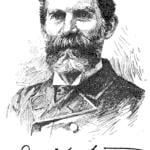 I’ve mentioned in a number of posts over the 18 months or so that I’ve begun a habit of simply listening to Scripture regularly – usually on my commute – in large chunks straight through. Despite having been raised in the church, for the most part in local churches that read Scripture publicly and emphasized individual reading and study of scripture, this experience has been enlightening on so many levels. There were no surprises – I knew all of the major stories, characters, and themes. But, one simply does not get the full impact of the major unifying themes of Scripture from the typical Bible lesson, devotional, or sermon topic focus that is so common. Or at least I didn’t get the full impact.
I’ve mentioned in a number of posts over the 18 months or so that I’ve begun a habit of simply listening to Scripture regularly – usually on my commute – in large chunks straight through. Despite having been raised in the church, for the most part in local churches that read Scripture publicly and emphasized individual reading and study of scripture, this experience has been enlightening on so many levels. There were no surprises – I knew all of the major stories, characters, and themes. But, one simply does not get the full impact of the major unifying themes of Scripture from the typical Bible lesson, devotional, or sermon topic focus that is so common. Or at least I didn’t get the full impact.
Last summer (just over a year ago) I put up a post that gives my answer to a question that can often come up, especially in a University environment: How can you be a Christian? The answer derives from the impact of the New Testament message. Today’s post (largely because of a wind storm, lengthy power outage, and busier than usual schedule) is a very lightly edited repost of that original. On Thursday I will come back and look at some of this from a slightly different angle.
Alister McGrath in his book Doubting: Growing Through the Uncertainties of Faith makes the following observation:
It is very common for Christians to find themselves isolated at work or ridiculed for their faith. They are conscious of the fact that their faith marks them out as “abnormal” in the eyes of their colleagues. It’s almost as though they have to apologize for believing in God. Christian values and presuppositions are gradually being squeezed out of every area of modern Western culture. Many Christians find the new aggressiveness of secular culture deeply disturbing. It seems to call their faith into question. At best the world seems indifferent to their faith; at worst, it treats it as absurd. p. 118
This paragraph provides a very good description of the world in which I live. This isn’t a new development. It was true in the early 20th century, it was true as I grew up, and it is true today. But there is also little doubt but that the trend is intensifying. The intellectual assault on Christian faith is significant.
But there is a new development, or at least a development that seems new to me. The aggressiveness of the secular culture is magnified in response to the image that Christians have in this culture. Christians, especially conservative Christians (evangelicals and/or fundamentalists) are often viewed as a judgmental and negative people with a conservative political agenda, who feel the poor and alien deserve their fate, justify violence, oppress women, hate gays, fight among themselves, distrust scientists, use deceit, dishonesty, and lies to get their message across, and often do it for personal gain – either money or power. This is a bit of an overstatement – I have not met anyone who gives all of these reasons, most are focused on only one or two. But there is still a real image problem. And frankly, all you have to do is read some Christian blogs to gain ample ammunition for many of these views.
I have been asked how I can be a Christian, and the conflict between science and religion, belief in the supernatural, is part of the question – but it isn’t the biggest issue. The bigger issues are those related to oppression, especially what comes across as oppression of women, and arrogance.
What do you see as the biggest stumbling blocks to the message of the gospel?
What answer would you give to the question “How can you be a Christian?”
How can I be a Christian? The “correct” answer, I suppose, is by the grace of God through the power of the Spirit. I think this is true – but it isn’t the whole story. The whole story has to be fleshed out by the details – and the details include the the church and the mission of the church.
Consider the instructions given to the people of God (aka “the church”) in the pages of the New Testament, and bear in mind with it the frequent warning that “by their fruit you will recognize them” – both those who are true and those who are false. None of us will accomplish these with perfection – but they should be the aim and the ideal. The following isn’t the sum total – but it is a good sized chunk of the New Testament teachings:
“But to you who are listening I say: Love your enemies, do good to those who hate you, bless those who curse you, pray for those who mistreat you. …Do to others as you would have them do to you. (Lk 6:27-28, 31) (See also Mt 5:43-45)
Jesus called them together and said, “You know that the rulers of the Gentiles lord it over them, and their high officials exercise authority over them. Not so with you. Instead, whoever wants to become great among you must be your servant, and whoever wants to be first must be your slave— just as the Son of Man did not come to be served, but to serve, and to give his life as a ransom for many.” (Mt 20:25-28) (See also Mt 23:8-12, Mk 10:42-45, Lk 22:24-27, Jn 13:14)
“The most important one,” answered Jesus, “is this: ‘Hear, O Israel: The Lord our God, the Lord is one. Love the Lord your God with all your heart and with all your soul and with all your mind and with all your strength.’ The second is this: ‘Love your neighbor as yourself.’ There is no commandment greater than these.” (Mk 12:29-31) (See also Mt 22:36-40, Lk 10:25-28)
“A new command I give you: Love one another. As I have loved you, so you must love one another. By this everyone will know that you are my disciples, if you love one another.” (Jn 13:34-35)
Be devoted to one another in love. Honor one another above yourselves. (Rm 12:10)
Live in harmony with one another. Do not be proud, but be willing to associate with people of low position. Do not be conceited. (Rm 12:16)
If it is possible, as far as it depends on you, live at peace with everyone. (Rm 12:18)
Let no debt remain outstanding, except the continuing debt to love one another, for whoever loves others has fulfilled the law. The commandments, … are summed up in this one command: “Love your neighbor as yourself.” Love does no harm to a neighbor. Therefore love is the fulfillment of the law. (Rm 13:8-10)
Love is patient, love is kind. It does not envy, it does not boast, it is not proud. It does not dishonor others, it is not self-seeking, it is not easily angered, it keeps no record of wrongs. Love does not delight in evil but rejoices with the truth. It always protects, always trusts, always hopes, always perseveres. (1 Cor 13:4-7)
Carry each other’s burdens, and in this way you will fulfill the law of Christ. (Ga 6:2)
Be completely humble and gentle; be patient, bearing with one another in love. Make every effort to keep the unity of the Spirit through the bond of peace. (Ep 4:2-3)
Do nothing out of selfish ambition or vain conceit. Rather, in humility value others above yourselves, not looking to your own interests but each of you to the interests of the others. (Ph 2:3-4)
My brothers and sisters, believers in our glorious Lord Jesus Christ must not show favoritism. … If you really keep the royal law found in Scripture, “Love your neighbor as yourself,” you are doing right. But if you show favoritism, you sin and are convicted by the law as lawbreakers. (Ja 2:1, 8-9)
Dear friends, let us love one another, for love comes from God. Everyone who loves has been born of God and knows God. Whoever does not love does not know God, because God is love. (1 Jn 4:7-8)
God is love. Whoever lives in love lives in God, and God in them. We love because he first loved us. Whoever claims to love God yet hates a brother or sister is a liar. For whoever does not love their brother and sister, whom they have seen, cannot love God, whom they have not seen. And he has given us this command: Anyone who loves God must also love their brother and sister. (1 Jn 4:16,19-21)
And now, dear lady, I am not writing you a new command but one we have had from the beginning. I ask that we love one another. And this is love: that we walk in obedience to his commands. As you have heard from the beginning, his command is that you walk in love. (2 Jn 5-6)
As Jesus started on his way, a man ran up to him and fell on his knees before him. “Good teacher,” he asked, “what must I do to inherit eternal life?” … Jesus looked at him and loved him. “One thing you lack,” he said. “Go, sell everything you have and give to the poor, and you will have treasure in heaven. Then come, follow me.” (Mk 10:17,21) (See also Mt 19:21, Lk 12:15, Lk 12:33-34, Lk 18:18,22)
This is softened a little later in the New Testament, I think because call isn’t to radical poverty, but to radical love. Love of wealth hinders, even prevents, love for one another.
Command those who are rich in this present world not to be arrogant nor to put their hope in wealth, which is so uncertain, but to put their hope in God, who richly provides us with everything for our enjoyment. Command them to do good, to be rich in good deeds, and to be generous and willing to share. In this way they will lay up treasure for themselves as a firm foundation for the coming age, so that they may take hold of the life that is truly life. (1 Tm 6:17-19)
Keep on loving one another as brothers and sisters. … Keep your lives free from the love of money and be content with what you have, because God has said, “Never will I leave you; never will I forsake you.” (He 13:1-5)
And now a slightly different set of directions – but related to those above.
Let us behave decently, as in the daytime, not in carousing and drunkenness, not in sexual immorality and debauchery, not in dissension and jealousy. (Rm 13:13)
So I say, walk by the Spirit, and you will not gratify the desires of the flesh. … But the fruit of the Spirit is love, joy, peace, forbearance, kindness, goodness, faithfulness, gentleness and self-control. Against such things there is no law. Those who belong to Christ Jesus have crucified the flesh with its passions and desires. Since we live by the Spirit, let us keep in step with the Spirit. Let us not become conceited, provoking and envying each other. (Ga 5:16, 19-26)
Therefore each of you must put off falsehood and speak truthfully to your neighbor, for we are all members of one body. … Do not let any unwholesome talk come out of your mouths, but only what is helpful for building others up according to their needs, that it may benefit those who listen. … Get rid of all bitterness, rage and anger, brawling and slander, along with every form of malice. Be kind and compassionate to one another, forgiving each other, just as in Christ God forgave you. (Ep 4:25-32)
But among you there must not be even a hint of sexual immorality, or of any kind of impurity, or of greed, because these are improper for God’s holy people. Nor should there be obscenity, foolish talk or coarse joking, which are out of place, but rather thanksgiving. (Ep 5:3-4)
Put to death, therefore, whatever belongs to your earthly nature: sexual immorality, impurity, lust, evil desires and greed, which is idolatry. …But now you must also rid yourselves of all such things as these: anger, rage, malice, slander, and filthy language from your lips. … Therefore, as God’s chosen people, holy and dearly loved, clothe yourselves with compassion, kindness, humility, gentleness and patience. Bear with each other and forgive one another if any of you has a grievance against someone. Forgive as the Lord forgave you. And over all these virtues put on love, which binds them all together in perfect unity. (Col 3: 5, 8, 12-14)
Who is wise and understanding among you? Let them show it by their good life, by deeds done in the humility that comes from wisdom. But if you harbor bitter envy and selfish ambition in your hearts, do not boast about it or deny the truth. Such “wisdom” does not come down from heaven but is earthly, unspiritual, demonic. For where you have envy and selfish ambition, there you find disorder and every evil practice. But the wisdom that comes from heaven is first of all pure; then peace-loving, considerate, submissive, full of mercy and good fruit, impartial and sincere. (Ja 3:13-17)
Finally, all of you, be like-minded, be sympathetic, love one another, be compassionate and humble. Do not repay evil with evil or insult with insult. On the contrary, repay evil with blessing, because to this you were called so that you may inherit a blessing. (1 Pt 3:8-9)
For this very reason, make every effort to add to your faith goodness; and to goodness, knowledge; and to knowledge, self-control; and to self-control, perseverance; and to perseverance, godliness; and to godliness, mutual affection; and to mutual affection, love. (2 Pt 1:5-7)
I’m going to go out on a limb – all of the instructions contained in the New Testament, including those governing the relationships of husbands and wives, parents and children, young and old, slaves and masters, church elders and members, are governed by the directives above to love one another.
I will make another observation as well. While outreach and mission are certainly important, the command to love is directed first, but not only, to one another. That is to fellow Christians and to the local body of Christians. The local church should embody love for one another as a family and as the body of Christ. Through that witness I think we would find a much more open field for the message of the gospel.
If we really took the Bible seriously, believed what it says, and acted on it, Christianity would have a much better reputation. Frankly, I think I am a Christian today because most of the Christians I knew growing up thought these were to be taken seriously. None of them carried through always or with perfection, everyone failed at them more or less often – but as far as I know each and every one of them thought this was the ideal toward which we should aim. It is probably not a coincidence that the vision statement of this church was “a church with a mission to care.” It wasn’t at the expense of theology, or at the expense of evangelism, but as a conviction that without love for one another all our theological precision, our faith, our speaking, and even our giving, is for nothing (1 Cor 13).
If you wish to contact me directly you may do so at rjs4mail[at]att.net
If interested you can subscribe to a full text feed of my posts at Musings on Science and Theology.


















